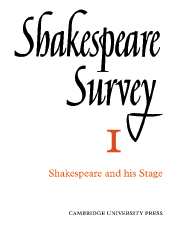Book contents
- Frontmatter
- Studies in the Elizabethan Stage since 1900
- Titus Andronicus on the Stage in 1595
- A Note on the Swan Theatre Drawing
- The Bankside Theatres: Early Engravings
- Shakespeare and the Blackfriars Theatre
- Shakespeare’s Bad Poetry
- The Folger Shakespeare Library
- The Heritage of Shakespeare’s Birthplace
- Three Shakespearian Productions: A Conversation
- Four Lears
- London Productions
- Stratford Productions
- International News
- The Year's Contributions to Shakespearian Study 1 Critical Studies
- 2 Shakespeare’s Life and Times
- 3 Textual Studies
- Books Received
- Index
- Plate section
3 - Textual Studies
Published online by Cambridge University Press: 28 March 2007
- Frontmatter
- Studies in the Elizabethan Stage since 1900
- Titus Andronicus on the Stage in 1595
- A Note on the Swan Theatre Drawing
- The Bankside Theatres: Early Engravings
- Shakespeare and the Blackfriars Theatre
- Shakespeare’s Bad Poetry
- The Folger Shakespeare Library
- The Heritage of Shakespeare’s Birthplace
- Three Shakespearian Productions: A Conversation
- Four Lears
- London Productions
- Stratford Productions
- International News
- The Year's Contributions to Shakespearian Study 1 Critical Studies
- 2 Shakespeare’s Life and Times
- 3 Textual Studies
- Books Received
- Index
- Plate section
Summary
Any year in which three volumes of the New Cambridge Shakespeare are published can be accounted profitable for the students of Shakespeare’s text. Perhaps the choice of titles (1 and 2 Henry IV and Henry V) was fortuitious, but a careful reading of these plays is peculiarly appropriate in these post-war years, and their publication has the same timeliness that John Dover Wilson discovers in Shakespeare’s composition of Henry V.
In a word [he writes], Henry V, so apposite in theme and spirit, as I and many others discovered, to the dispatch of a great expeditionary force in 1914, was actually written for a similar occasion in 1599 [the invasion of Ireland under the Earl of Essex]. Yet it would have been written in any case about this time, and the occasion was for Shakespeare a stroke of luck. . . . For the zenith of the play is not the victory—that is lightly passed over, and (in itself miraculous) is ascribed to God alone—but the King’s speeches before the battle is joined, the battle which all but the King think already lost. Every line of what Henry then says breathes the English temper, but one above all—
We happy few, we band of brothers.
If History never repeats itself, the human spirit often does: Henry’s words before Agincourt, and Churchill’s after the Battle of Britain, come from the same national mint.
- Type
- Chapter
- Information
- Shakespeare Survey , pp. 127 - 131Publisher: Cambridge University PressPrint publication year: 1948

